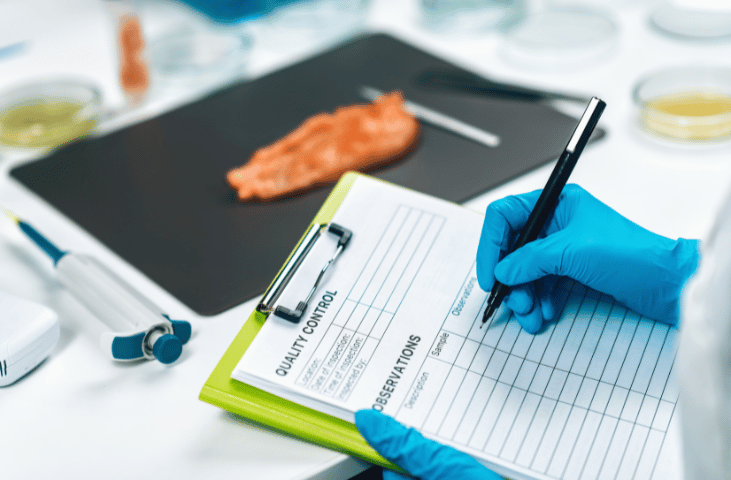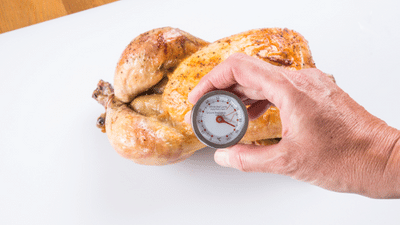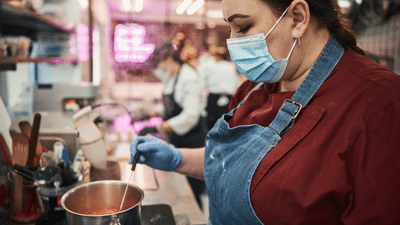Food Hygiene Legislation
Learning and applying what you learn in a food hygiene course starts with understanding the basic food principles and what pieces of food hygiene legislation inform them.
These regulations are not just there to teach you the best practice. They are there to ensure employers and employees are held accountable for food hygiene failures. These failures also come with huge costs associated with poor food safety. Because of all this, there is a set of enforced legislation to ensure food safety and accountability.
In this blog, we’ll take a look at the legislation that has been relevant to the UK since the 1990s including remissions, amendments and updates.
The Food Safety Act 1990 is the framework for all food legislation that came after it across England, Wales, and Scotland. The first major piece of food regulation, it established that food businesses were wholly responsible for the safety of the food they sold. The regulations centred around food being labelled accurately and that nothing was added that could cause harm. The main responsibilities covered by the Food Safety Act include:
- Not including or removing anything in food or treating it in a way which means it would be damaging to the health of people eating it.
- That the food business sells its products of the nature, substance, and quality which customers would expect.
- The rule that all food is labelled and presented in a way that is not false or misleading.
The following year, The Food Safety (Northern Ireland) Order 1991 came into effect for Northern Ireland – covering the same regulations and guidance.
The Food Standards Act 1999 was to establish the Food Standards Agency (FSA). The legislation gives power to the central agency in relation to food safety standards. The guidance featured in the legislation outlines the FSA’s mission to protect public health when it comes to the manufacturing and selling of food.
It gives them the power to act in the consumer’s interest at any stage in the food production and supply chain.
EU law Regulation 178, sometimes known as ‘General Food Law 2002’ was forwarded to protect human health in relation to food. It applies to all stages of food production, processing, and distribution. It also provides national law for:
- Bulk transport by sea of liquid oils, fats, or raw sugar.
- The direct supply of small quantities of meat from poultry slaughtered on a farm.
- Temperature control in food retail establishments.
- Restrictions on the sales and supply of raw cows’ milk.
The General Food Regulations 2004 established the European Food Safety Authority (EFSA) and laid out the general principles and procedures of food safety. The act also applies certain provisions of the Food Safety Act 1990 and make provision for offences and penalties.
The regulations prohibit the placement and sale of unsafe food on the market, as well as prohibiting any labelling or advertisement that misleads consumers. It imposed the ability to trace food business operators who did not comply with these standards.
The Food Hygiene (England) Regulations 2006 are considered to be the most important set of food hygiene regulations in the UK. The general aim of the act places an obligation on all food business to make sure their processes and procedures are underpinned by the upkeep of hygiene.
The regulations make it an offence for businesses to supply food which is not safe to be eaten. It also specifies that:
- All food businesses must register with the relevant authorities.
- Food should always be labelled correctly and should meet the relevant quality standards.
- Premises used for the preparation or sale of foods are designed in a way that permits and does not hamper good hygiene.
- All food businesses should have suitable pest control measures.
The Food Hygiene Regulations (England) 2006 was also the first piece of legislation to make it a legal duty to ensure that all members of staff have adequate training in food safety and food hygiene.
The act was amended and applied to Scotland, Wales and Northern Ireland also.
The Food Safety and Hygiene (England) Regulations 2013 are a set of regulations that enable local and national authorities to have a strong role in ensuring food businesses are selling food that’s safe.
They ensure that competent local authorities have processes in place restrictions on the sale of any kind of food that’s on the market. This allows them to create a system whereby they can trace food sold and that authorities can be clearly informed of where food comes from.
It also requires that food businesses must collaborate with authorities to ensure that the risk from the food they produce and/or sell is as low as possible. Similar laws cover Scotland, Wales, and Northern Ireland.
The Food Information Regulations 2014 enables local authorities to enforce the law that states businesses need to provide allergen information if the food contains any of the 14 allergens as listed in the FIC regulations.
The food referenced in these regulations was in relation to non-prepacked foods, food items sold at catering businesses and foods wrapped on site. These rules only cover information about the allergens used as ingredients – not allergens present as a result of cross contamination.
From October 2021, these regulations (for Direct Sale Foods) ensure that they must be labelled with the following mandatory information:
- The clear descriptive name of the food.
- A full list of ingredients that the food is made with.
- Allergen information (emphasised in the ingredients list) that is relevant.
This update came as a result of coming into effect in the UK.
Don’t take any chances when it comes to food safety
These pieces of food hygiene legislation are in place to ensure that serious incidents are avoided as much as possible. If they aren’t avoided, they help identify what went wrong. To avoid slips in food hygiene and the effects it can have on your business, food hygiene training for all staff is so important. It will teach you all you need to know about the relevant regulations.
Our friendly customer support team is always happy to talk through your food hygiene training options. Why not give us a call on 01327 552136, email us at hello@smarthorizons.co.uk, or use the live chat feature on this website to speak to us during office hours.
Related Links








